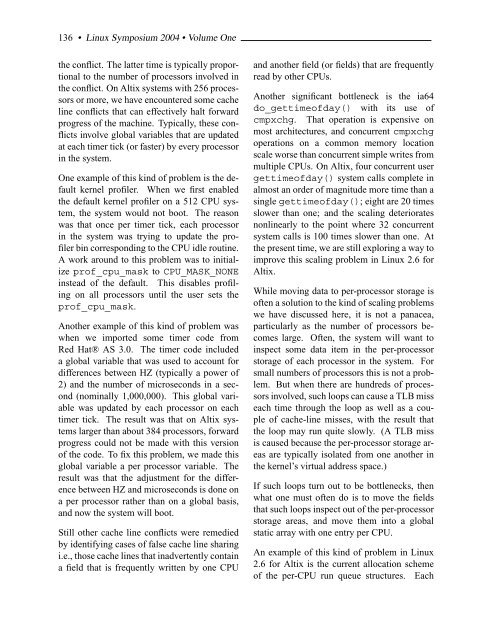You also want an ePaper? Increase the reach of your titles
YUMPU automatically turns print PDFs into web optimized ePapers that Google loves.
136 • <strong>Linux</strong> Symposium 2004 • Volume <strong>One</strong><br />
the conflict. <strong>The</strong> latter time is typically proportional<br />
to the number of processors involved in<br />
the conflict. On Altix systems with 256 processors<br />
or more, we have encountered some cache<br />
line conflicts that can effectively halt forward<br />
progress of the machine. Typically, these conflicts<br />
involve global variables that are updated<br />
at each timer tick (or faster) by every processor<br />
in the system.<br />
<strong>One</strong> example of this kind of problem is the default<br />
kernel profiler. When we first enabled<br />
the default kernel profiler on a 512 CPU system,<br />
the system would not boot. <strong>The</strong> reason<br />
was that once per timer tick, each processor<br />
in the system was trying to update the profiler<br />
bin corresponding to the CPU idle routine.<br />
A work around to this problem was to initialize<br />
prof_cpu_mask to CPU_MASK_NONE<br />
instead of the default. This disables profiling<br />
on all processors until the user sets the<br />
prof_cpu_mask.<br />
Another example of this kind of problem was<br />
when we imported some timer code from<br />
Red Hat® AS 3.0. <strong>The</strong> timer code included<br />
a global variable that was used to account for<br />
differences between HZ (typically a power of<br />
2) and the number of microseconds in a second<br />
(nominally 1,000,000). This global variable<br />
was updated by each processor on each<br />
timer tick. <strong>The</strong> result was that on Altix systems<br />
larger than about 384 processors, forward<br />
progress could not be made with this version<br />
of the code. To fix this problem, we made this<br />
global variable a per processor variable. <strong>The</strong><br />
result was that the adjustment for the difference<br />
between HZ and microseconds is done on<br />
a per processor rather than on a global basis,<br />
and now the system will boot.<br />
Still other cache line conflicts were remedied<br />
by identifying cases of false cache line sharing<br />
i.e., those cache lines that inadvertently contain<br />
a field that is frequently written by one CPU<br />
and another field (or fields) that are frequently<br />
read by other CPUs.<br />
Another significant bottleneck is the ia64<br />
do_gettimeofday() with its use of<br />
cmpxchg. That operation is expensive on<br />
most architectures, and concurrent cmpxchg<br />
operations on a common memory location<br />
scale worse than concurrent simple writes from<br />
multiple CPUs. On Altix, four concurrent user<br />
gettimeofday() system calls complete in<br />
almost an order of magnitude more time than a<br />
single gettimeofday(); eight are 20 times<br />
slower than one; and the scaling deteriorates<br />
nonlinearly to the point where 32 concurrent<br />
system calls is 100 times slower than one. At<br />
the present time, we are still exploring a way to<br />
improve this scaling problem in <strong>Linux</strong> 2.6 for<br />
Altix.<br />
While moving data to per-processor storage is<br />
often a solution to the kind of scaling problems<br />
we have discussed here, it is not a panacea,<br />
particularly as the number of processors becomes<br />
large. Often, the system will want to<br />
inspect some data item in the per-processor<br />
storage of each processor in the system. For<br />
small numbers of processors this is not a problem.<br />
But when there are hundreds of processors<br />
involved, such loops can cause a TLB miss<br />
each time through the loop as well as a couple<br />
of cache-line misses, with the result that<br />
the loop may run quite slowly. (A TLB miss<br />
is caused because the per-processor storage areas<br />
are typically isolated from one another in<br />
the kernel’s virtual address space.)<br />
If such loops turn out to be bottlenecks, then<br />
what one must often do is to move the fields<br />
that such loops inspect out of the per-processor<br />
storage areas, and move them into a global<br />
static array with one entry per CPU.<br />
An example of this kind of problem in <strong>Linux</strong><br />
2.6 for Altix is the current allocation scheme<br />
of the per-CPU run queue structures. Each

















